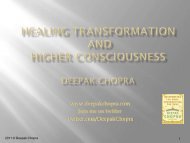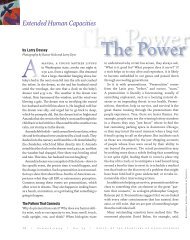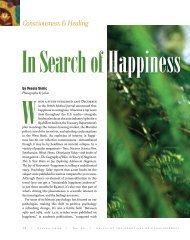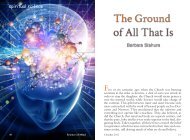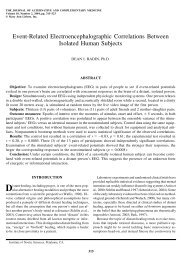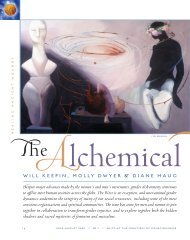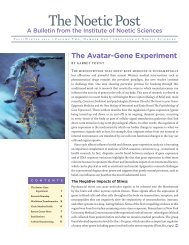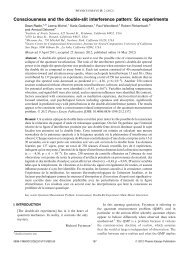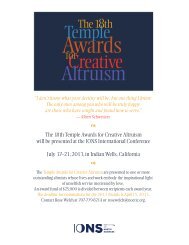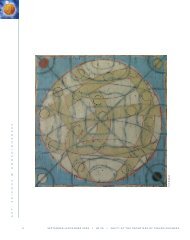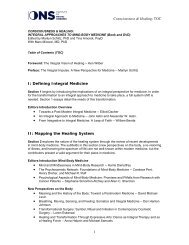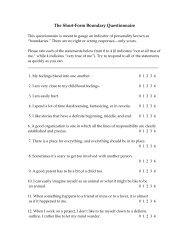Why the Bleep? - Institute of Noetic Sciences
Why the Bleep? - Institute of Noetic Sciences
Why the Bleep? - Institute of Noetic Sciences
Create successful ePaper yourself
Turn your PDF publications into a flip-book with our unique Google optimized e-Paper software.
he film conceived by three students<br />
<strong>of</strong> a channeled ancient warrior named Ramtha got<br />
<strong>of</strong>f to an inauspicious beginning.When traditional<br />
movie producers turned <strong>the</strong>ir noses up at What <strong>the</strong><br />
<strong>Bleep</strong> Do We Know!?, <strong>the</strong> production was financed<br />
by one <strong>of</strong> its three filmmakers; when mainstream movie<br />
houses rejected <strong>the</strong> final product, it became a blockbuster<br />
hit through independent film venues, winning five<br />
independent film awards along <strong>the</strong> way. It’s been <strong>the</strong><br />
subject <strong>of</strong> much derision from mainstream press and<br />
scientists, yet an estimated five million people have seen<br />
<strong>the</strong> film, which had a long run as one <strong>of</strong> Amazon.com’s<br />
top sellers.<br />
The movie strings toge<strong>the</strong>r scientific discoveries with<br />
religious and mystical traditions to create a syn<strong>the</strong>sis <strong>of</strong><br />
information suggesting that we can change our lives and<br />
our realities by simply adjusting our perspective.Is that why<br />
this funky little film caught <strong>the</strong> attention <strong>of</strong> so many<br />
viewers and why it has generated so much controversy?<br />
Is it scientifically valid, science fiction, fable, or an alchemy<br />
<strong>of</strong> all three?<br />
“I think it’s because we’re asking questions in this<br />
film that people wanted answers to or wanted to<br />
ask <strong>the</strong>mselves,” says director Betsy Chasse, who shares<br />
filmmaker credit with Mark Vicente and William Arntz.<br />
<strong>Bleep</strong> interviewee John Hagelin, a quantum physicist and<br />
director <strong>of</strong> <strong>the</strong> <strong>Institute</strong> <strong>of</strong> Science, Technology, and<br />
Public Policy at Maharishi University <strong>of</strong> Management,<br />
TRISH RILEY<br />
contends,“People are ready for knowledge <strong>of</strong> unity, and<br />
<strong>the</strong> film is a powerful medium to present that knowledge,<br />
which has world-transforming significance.”<br />
IT’S NOT THE SCIENCE,<br />
IT’S THE SPIRIT<br />
A Newsweek-Beliefnet poll taken in August 2005 reveals<br />
that <strong>of</strong> 1,004 Americans, 55 percent consider <strong>the</strong>mselves<br />
“religious and spiritual,” while ano<strong>the</strong>r 24 percent describe<br />
<strong>the</strong>mselves as “spiritual.” Two thirds say <strong>the</strong>y pray daily and<br />
a third meditate.<br />
Prayer, meditation, chanting, visualization—it’s all<br />
about focusing attention to achieve a higher level <strong>of</strong><br />
consciousness. It’s not new and <strong>the</strong>re are many avenues<br />
to what some call enlightenment, but <strong>the</strong> underlying<br />
practices yield <strong>the</strong> same or similar results.<br />
“Wherever one looks, spirituality is on <strong>the</strong> billboard,”<br />
says Nathan Katz, PhD, director <strong>of</strong> <strong>the</strong> Center for <strong>the</strong> Study<br />
<strong>of</strong> Spirituality at Florida International University. Katz<br />
believes <strong>the</strong> popularity <strong>of</strong> <strong>the</strong> film is based in our shared<br />
fundamental need to understand <strong>the</strong> mysteries <strong>of</strong> life.<br />
“It strikes a very deep issue, that <strong>of</strong> spirituality,” he says.<br />
“The <strong>Bleep</strong> movie is about what I call ‘secular spirituality,’<br />
<strong>the</strong> contemporary phenomenon—mostly but not entirely<br />
American—<strong>of</strong> applying spiritual insights to issues such as<br />
health care, <strong>the</strong> environment, physics, art, education,<br />
and so on.” ‹<br />
SHIFT: AT THE FRONTIERS OF CONSCIOUSNESS • # 9 • DECEMBER 2005–FEBRUARY 2006 21



